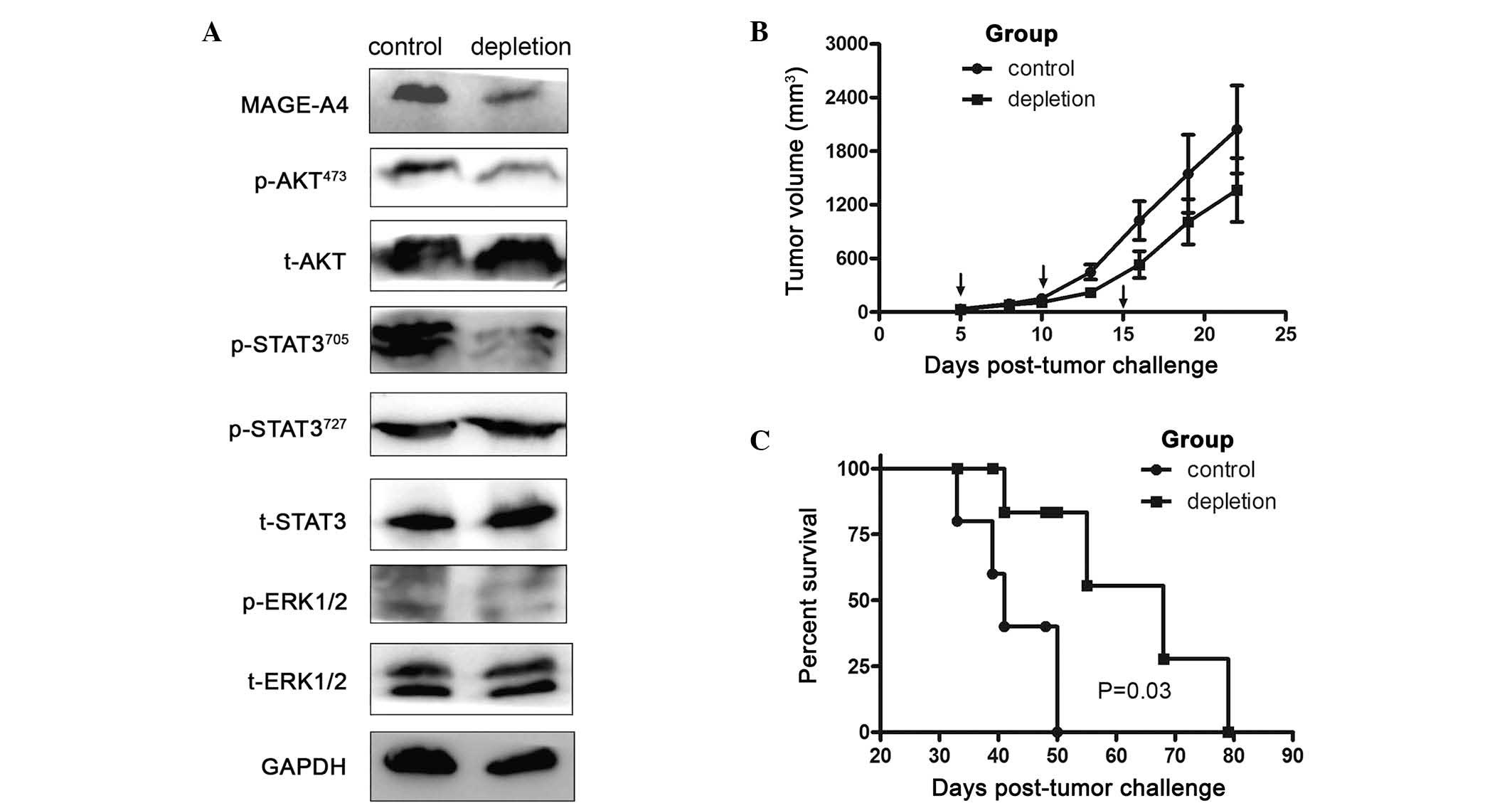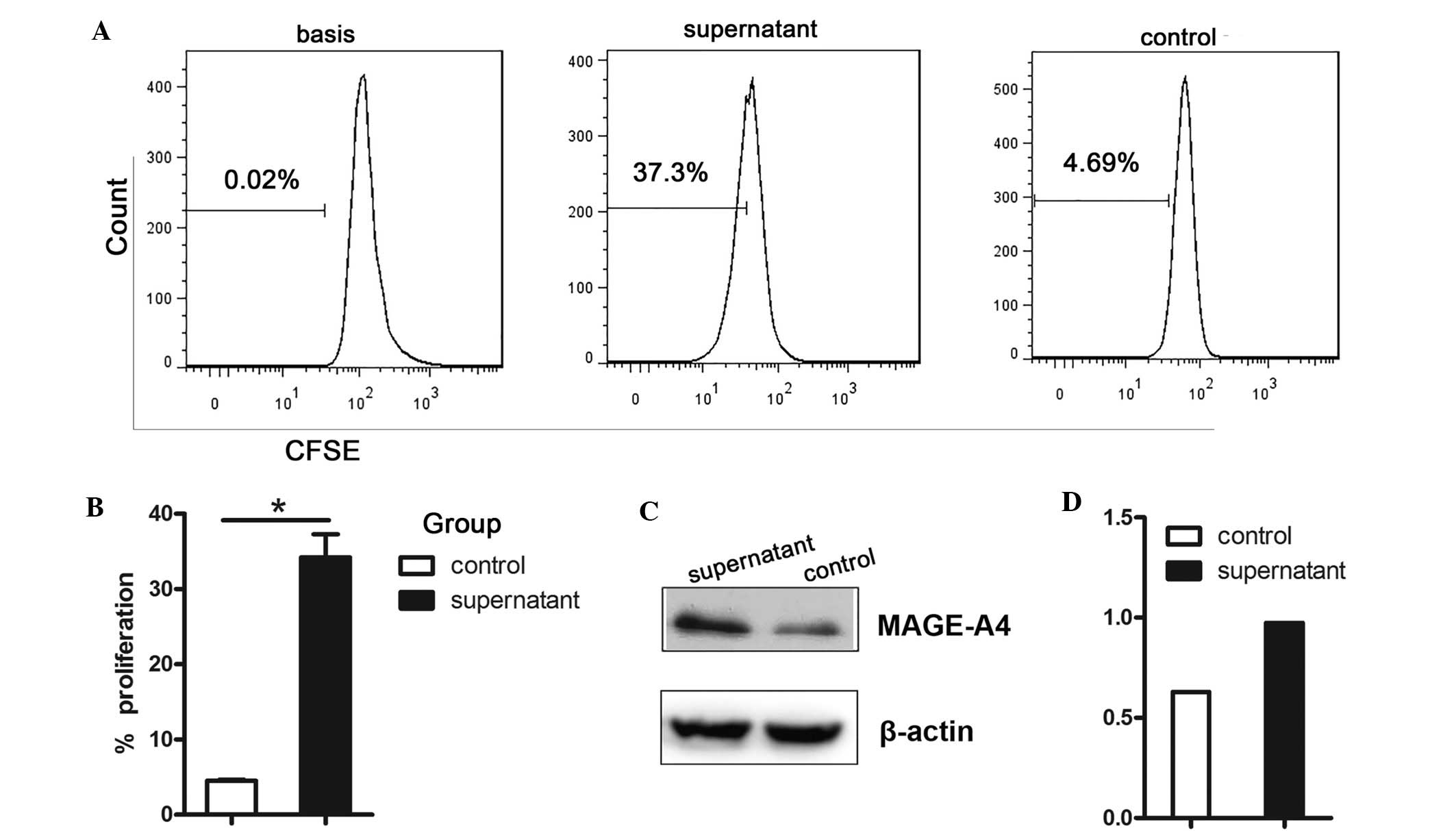|
1
|
Zhi X: The Sixth South-North forum of lung
cancer in China was held in CPPCC auditorium. Zhongguo Fei Ai Za
Zhi. 16:661–662. 2013.(In Chinese). PubMed/NCBI
|
|
2
|
Shigematsu Y, Hanagiri T, Shiota H, Kuroda
K, Baba T, Mizukami M, So T, Ichiki Y, Yasuda M, So T, et al:
Clinical significance of cancer/testis antigens expression in
patients with non-small cell lung cancer. Lung Cancer. 68:105–110.
2010. View Article : Google Scholar : PubMed/NCBI
|
|
3
|
Coulie PG, Karanikas V, Lurquin C, Colau
D, Connerotte T, Hanagiri T, Van Pel A, Lucas S, Godelaine D,
Lonchay C, et al: Cytolytic T-cell responses of cancer patients
vaccinated with a MAGE antigen. Immunol Rev. 188:33–42. 2002.
View Article : Google Scholar : PubMed/NCBI
|
|
4
|
Baba T, Shiota H, Kuroda K, Shigematsu Y,
Ichiki Y, Uramoto H, Hanagiri T and Tanaka F: Clinical significance
of human leukocyte antigen loss and melanoma-associated antigen 4
expression in smokers of non-small cell lung cancer patients. Int J
Clin Oncol. 18:997–1004. 2013. View Article : Google Scholar : PubMed/NCBI
|
|
5
|
Dhodapkar MV, Osman K, Teruya-Feldstein J,
Filippa D, Hedvat CV, Iversen K, Kolb D, Geller MD, Hassoun H,
Kewalramani T, et al: Expression of cancer/testis (CT) antigens
MAGE-A1, MAGE-A3, MAGE-A4, CT-7 and NY-ESO-1 in malignant
gammopathies is heterogeneous and correlates with site, stage and
risk status of disease. Cancer Immun. 3:92003.PubMed/NCBI
|
|
6
|
Bolli M, Kocher T, Adamina M, Guller U,
Dalquen P, Haas P, Mirlacher M, Gambazzi F, Harder F, Heberer M, et
al: Tissue microarray evaluation of melanoma antigen E (MAGE)
tumor-associated antigen expression: Potential indications for
specific immunotherapy and prognostic relevance in squamous cell
lung carcinoma. Ann Surg. 236:785–793. 2002. View Article : Google Scholar : PubMed/NCBI
|
|
7
|
Yakirevich E, Sabo E, Lavie O, Mazareb S,
Spagnoli GC and Resnick MB: Expression of the MAGE-A4 and NY-ESO-1
cancer-testis antigens in serous ovarian neoplasms. Clin Cancer
Res. 9:6453–6460. 2003.PubMed/NCBI
|
|
8
|
Yoshida N, Abe H, Ohkuri T, Wakita D, Sato
M, Noguchi D, Miyamoto M, Morikawa T, Kondo S, Ikeda H, et al:
Expression of the MAGE-A4 and NY-ESO-1 cancer-testis antigens and T
cell infiltration in non-small cell lung carcinoma and their
prognostic significance. Int J Oncol. 28:1089–1098. 2006.PubMed/NCBI
|
|
9
|
Zou W and Chen L: Inhibitory B7-family
molecules in the tumour microenvironment. Nat Rev Immunol.
8:467–477. 2008. View
Article : Google Scholar : PubMed/NCBI
|
|
10
|
Ostrand-Rosenberg S and Sinha P:
Myeloid-derived suppressor cells: Linking inflammation and cancer.
J Immunol. 182:4499–4506. 2009. View Article : Google Scholar : PubMed/NCBI
|
|
11
|
Gabrilovich DI and Nagaraj S:
Myeloid-derived suppressor cells as regulators of the immune
system. Nat Rev Immunol. 9:162–174. 2009. View Article : Google Scholar : PubMed/NCBI
|
|
12
|
Gabrilovich DI, Ostrand-Rosenberg S and
Bronte V: Coordinated regulation of myeloid cells by tumours. Nat
Rev Immunol. 12:253–268. 2012. View
Article : Google Scholar : PubMed/NCBI
|
|
13
|
Marcar L, Maclaine NJ, Hupp TR and Meek
DW: Mage-A cancer/testis antigens inhibit p53 function by blocking
its interaction with chromatin. Cancer Res. 70:10362–10370. 2010.
View Article : Google Scholar : PubMed/NCBI
|
|
14
|
Srivastava MK, Zhu L, Harris-White M,
Huang M, St John M, Lee JM, Salgia R, Cameron RB, Strieter R,
Dubinett S, et al: Targeting myeloid-derived suppressor cells
augments antitumor activity against lung cancer. Immunotargets
Ther. 2012:7–12. 2012.PubMed/NCBI
|
|
15
|
Srivastava MK, Zhu L, Harris-White M, Kar
UK, Huang M, Johnson MF, Lee JM, Elashoff D, Strieter R, Dubinett
S, Sharma S, et al: Myeloid suppressor cell depletion augments
antitumor activity in lung cancer. PLoS One. 7:e406772012.
View Article : Google Scholar : PubMed/NCBI
|
|
16
|
Groeper C, Gambazzi F, Zajac P, Bubendorf
L, Adamina M, Rosenthal R, Zerkowski HR, Heberer M and Spagnoli GC:
Cancer/testis antigen expression and specific cytotoxic T
lymphocyte responses in non small cell lung cancer. Int J Cancer.
120:337–343. 2007. View Article : Google Scholar : PubMed/NCBI
|
|
17
|
Cui NP, Xie SJ, Han JS, Ma ZF, Chen BP and
Cai JH: Effective adoptive transfer of haploidentical
tumor-specific T cells in B16-melanoma bearing mice. Chin Med J
(Engl). 125:794–800. 2012.PubMed/NCBI
|
|
18
|
Morales JK, Kmieciak M, Knutson KL, Bear
HD and Manjili MH: GM-CSF is one of the main breast tumor-derived
soluble factors involved in the differentiation of CD11b-Gr1- bone
marrow progenitor cells into myeloid-derived suppressor cells.
Breast Cancer Res Treat. 123:39–49. 2010. View Article : Google Scholar : PubMed/NCBI
|
|
19
|
Baumgartner CK, Ferrante A, Nagaoka M,
Gorski J and Malherbe LP: Peptide-MHC class II complex stability
governs CD4 T cell clonal selection. J Immunol. 84:573–581. 2010.
View Article : Google Scholar
|
|
20
|
Wolchok JD, Hoos A, O'Day S, Weber JS,
Hamid O, Lebbé C, Maio M, Binder M, Bohnsack O, Nichol G, et al:
Guidelines for the evaluation of immune therapy activity in solid
tumors: Immune-related response criteria. Clin Cancer Res.
15:7412–7420. 2009. View Article : Google Scholar : PubMed/NCBI
|
|
21
|
Daudi S, Eng KH, Mhawech-Fauceglia P,
Morrison C, Miliotto A, Beck A, Matsuzaki J, Tsuji T, Groman A and
Gnjatic S: Expression and immune responses to MAGE antigens predict
survival in epithelial ovarian cancer. PLoS One. 9:e1040992014.
View Article : Google Scholar : PubMed/NCBI
|
|
22
|
Chaux P, Luiten R, Demotte N, Vantomme V,
Stroobant V, Traversari C, Russo V, Schultz E, Cornelis GR, Boon T,
et al: Identification of five MAGE-A1 epitopes recognized by
cytolytic T lymphocytes obtained by in vitro stimulation
with dendritic cells transduced with MAGE-A1. J Immunol.
163:2928–2936. 1999.PubMed/NCBI
|
|
23
|
Gunda V, Cogdill AP, Bernasconi MJ, Wargo
JA and Parangi S: Potential role of 5-aza-2′-deoxycytidine induced
MAGE-A4 expression in immunotherapy for anaplastic thyroid cancer.
Surgery. 154:1456–1462. 2013. View Article : Google Scholar : PubMed/NCBI
|
|
24
|
Ortiz ML, Lu L, Ramachandran I and
Gabrilovich DI: Myeloid-derived suppressor cells in the development
of lung cancer. Cancer Immunol Res. 2:50–58. 2014. View Article : Google Scholar : PubMed/NCBI
|
|
25
|
Nagorsen D, Scheibenbogen C, Marincola FM,
Letsch A and Keilholz U: Natural T cell immunity against cancer.
Clin Cancer Res. 9:4296–4303. 2003.PubMed/NCBI
|
|
26
|
Cuenca AG, Cuenca AL, Winfield RD, Joiner
DN, Gentile L, Delano MJ, Kelly-Scumpia KM, Scumpia PO, Matheny MK,
Scarpace PJ, et al: Novel role for tumor-induced expansion of
myeloid-derived cells in cancer cachexia. J Immunol. 192:6111–6119.
2014. View Article : Google Scholar : PubMed/NCBI
|
|
27
|
Duffour MT, Chaux P, Lurquin C, Cornelis
G, Boon T and van der Bruggen P: A MAGE-A4 peptide presented by
HLA-A2 is recognized by cytolytic T lymphocytes. Eur J Immunol.
29:3329–3337. 1999. View Article : Google Scholar : PubMed/NCBI
|
|
28
|
Kobayashi T, Lonchay C, Colau D, Demotte
N, Boon T and van der Bruggen P: New MAGE-4 antigenic peptide
recognized by cytolytic T lymphocytes on HLA-A1 tumor cells. Tissue
Antigens. 62:426–432. 2003. View Article : Google Scholar : PubMed/NCBI
|
|
29
|
Zhang Y, Stroobant V, Russo V, Boon T and
van der Bruggen P: A MAGE-A4 peptide presented by HLA-B37 is
recognized on human tumors by cytolytic T lymphocytes. Tissue
Antigens. 60:365–371. 2002. View Article : Google Scholar : PubMed/NCBI
|
|
30
|
Scanlan MJ, Altorki NK, Gure AO,
Williamson B, Jungbluth A, Chen YT and Old LJ: Expression of
cancer-testis antigens in lung cancer: Definition of bromodomain
testis-specific gene (BRDT) as a new CT gene, CT9. Cancer Lett.
150:155–164. 2000. View Article : Google Scholar : PubMed/NCBI
|
|
31
|
Schumacher K, Haensch W, Röefzaad C and
Schlag PM: Prognostic significance of activated CD8 (+) T cell
infiltrations within esophageal carcinomas. Cancer Res.
61:3932–3936. 2001.PubMed/NCBI
|
|
32
|
Cruz CR, Gerdemann U, Leen AM, Shafer JA,
Ku S, Tzou B, Horton TM, Sheehan A, Copeland A, Younes A, et al:
Improving T-cell therapy for relapsed EBV-negative Hodgkin lymphoma
by targeting upregulated MAGE-A4. Clin Cancer Res. 17:7058–7066.
2011. View Article : Google Scholar : PubMed/NCBI
|
|
33
|
Segura E and Villadangos JA: Antigen
presentation by dendritic cells in vivo. Curr Opin Immunol.
21:105–110. 2009. View Article : Google Scholar : PubMed/NCBI
|
|
34
|
Willimsky G and Blankenstein T: Sporadic
immunogenic tumours avoid destruction by inducing T-cell tolerance.
Nature. 437:141–146. 2005. View Article : Google Scholar : PubMed/NCBI
|
|
35
|
Drake CG, Jaffee E and Pardoll DM:
Mechanisms of immune evasion by tumors. Adv Immunol. 90:51–81.
2006. View Article : Google Scholar : PubMed/NCBI
|
|
36
|
Diaz-Montero CM, Salem ML, Nishimura MI,
Garrett-Mayer E, Cole DJ and Montero AJ: Increased circulating
myeloid-derived suppressor cells correlate with clinical cancer
stage, metastatic tumor burden and doxorubicin-cyclophosphamide
chemotherapy. Cancer Immunol Immunother. 58:49–59. 2009. View Article : Google Scholar : PubMed/NCBI
|
|
37
|
Meyer C, Cagnon L, Costa-Nunes CM,
Baumgaertner P, Montandon N, Leyvraz L, Michielin O, Romano E and
Speiser DE: Frequencies of circulating MDSC correlate with clinical
outcome of melanoma patients treated with ipilimumab. Cancer
Immunol Immunother. 63:247–257. 2014. View Article : Google Scholar : PubMed/NCBI
|
|
38
|
Shen P, Wang A, He M, Wang Q and Zheng S:
Increased circulating Lin(−/low) CD33(+) HLA-DR(−) myeloid-derived
suppressor cells in hepatocellular carcinoma patients. Hepatol Res.
44:639–650. 2014. View Article : Google Scholar : PubMed/NCBI
|
|
39
|
Bianchi G, Borgonovo G, Pistoia V and
Raffaghello L: Immunosuppressive cells and tumour microenvironment:
Focus on mesenchymal stem cells and myeloid derived suppressor
cells. Histol Histopathol. 26:941–951. 2011.PubMed/NCBI
|
|
40
|
Fujimura T, Mahnke K and Enk AH: Myeloid
derived suppressor cells and their role in tolerance induction in
cancer. J Dermatol Sci. 59:1–6. 2010. View Article : Google Scholar : PubMed/NCBI
|
|
41
|
Sevko A and Umansky V: Myeloid-derived
suppressor cells interact with tumors in terms of myelopoiesis,
tumorigenesis and immunosuppression: Thick as thieves. J Cancer.
4:3–11. 2013. View Article : Google Scholar : PubMed/NCBI
|
|
42
|
Umansky V and Sevko A: Tumor
microenvironment and myeloid-derived suppressor cells. Cancer
Microenviron. 6:169–177. 2013. View Article : Google Scholar : PubMed/NCBI
|
|
43
|
Jungbluth AA, Ely S, DiLiberto M,
Niesvizky R, Williamson B, Frosina D, Chen YT, Bhardwaj N,
Chen-Kiang S, Old LJ, et al: The cancer-testis antigens CT7
(MAGE-C1) and MAGE-A3/6 are commonly expressed in multiple myeloma
and correlate with plasma-cell proliferation. Blood. 106:167–174.
2005. View Article : Google Scholar : PubMed/NCBI
|
|
44
|
Forghanifard MM, Gholamin M, Farshchian M,
Moaven O, Memar B, Forghani MN, Dadkhah E, Naseh H, Moghbeli M,
Raeisossadati R, et al: Cancer-testis gene expression profiling in
esophageal squamous cell carcinoma: Identification of specific
tumor marker and potential targets for immunotherapy. Cancer Biol
Ther. 12:191–197. 2011. View Article : Google Scholar : PubMed/NCBI
|
|
45
|
Nagao T, Higashitsuji H, Nonoguchi K,
Sakurai T, Dawson S, Mayer RJ, Itoh K and Fujita J: MAGE-A4
interacts with the liver oncoprotein gankyrin and suppresses its
tumorigenic activity. J Biol Chem. 278:10668–10674. 2003.
View Article : Google Scholar : PubMed/NCBI
|
|
46
|
Park JH, Kong GH and Lee SW: hMAGE-A1
overexpression reduces TNF-alpha cytotoxicity in ME-180 cells. Mol
Cells. 14:122–129. 2002.PubMed/NCBI
|
|
47
|
Iclozan C, Antonia S, Chiappori A, Chen DT
and Gabrilovich D: Therapeutic regulation of myeloid-derived
suppressor cells and immune response to cancer vaccine in patients
with extensive stage small cell lung cancer. Cancer Immunol
Immunother. 62:909–918. 2013. View Article : Google Scholar : PubMed/NCBI
|
|
48
|
Waight JD, Netherby C, Hensen ML, Miller
A, Hu Q, Liu S, Bogner PN, Farren MR, Lee KP, Liu K, et al:
Myeloid-derived suppressor cell development is regulated by a
STAT/IRF-8 axis. J Clin Invest. 123:4464–4478. 2013. View Article : Google Scholar : PubMed/NCBI
|



















